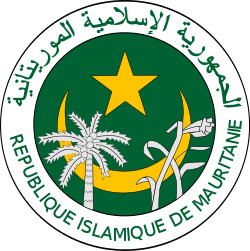History of Mauritania (1991–present)
Part of a series on the |
|---|
| History of Mauritania |
 |
|
|
1991-2000
Opposition parties were legalized and a new constitution approved in 1991 which put an end to formal military rule. However, Ould Taya's election wins were dismissed as fraudulent by both opposition groups and external observers. In 1998, Mauritania became the third Arab country to recognize Israel, despite strong internal opposition.
On 28 October 1999, Mauritanian Foreign Minister Ahmed Sid'Ahmed and his Israeli counterpart David Levy signed an agreement in Washington DC, USA, establishing full diplomatic relations between the two countries. The signing ceremony was held at the U.S. State Department in the presence of US Secretary of State Madeleine Albright. Mauritania thereby joined Egypt, Palestine, and Jordan as the only members of the Arab League to officially recognize Israel. Ould Taya also started co-operating with the United States in anti-terrorism activities, a policy which was criticized by some human rights organizations, which claimed that Mauritania's problem with terrorism was being misrepresented for geopolitical purposes.[1][2]
2001-2004
In 2001, elections incorporated more safeguards against voter fraud but opposition candidate (and former leader) Mohamed Khouna Ould Haidallah was nevertheless arrested prior to election day on charges of planning a coup, released the same day, and rearrested after the election. Attempted military coups and unrest instigated by Islamist opponents of the regime marred the early years of the 21st century, and the Taya regime's heavy-handed crackdowns were criticized by human rights groups.
On June 8, 2003 a failed coup attempt was made against President Maaouya Ould Sid'Ahmed Taya by forces unhappy with his imprisonment of Islamic leaders in the wake of the US-led invasion of Iraq and his establishment of full diplomatic relations with Israel. The coup was suppressed after one day of fighting in the capital when pro-Taya military forces arrived from the countryside. A number of government officials were detained after the coup including the head of the Supreme Court, Mahfoud Ould Lemrabott, and the Secretary of State for Women's Affairs, Mintata Mint Hedeid. The coup leader, Saleh Ould Hanenna, a former army colonel sacked for opposing Taya's pro-Israel policies, was not captured or killed during the coup.[3]
2005-2007
On August 3, 2005 the Mauritanian military, including members of the presidential guard, seized control of key points in the capital of Nouakchott, performing a coup against the government of President Maaouya Ould Sid'Ahmed Taya who was out of the country, attending the funeral of Saudi King Fahd. The officers released the following statement:
- "The national armed forces and security forces have unanimously decided to put a definitive end to the oppressive activities of the defunct authority, which our people have suffered from during the past years."[4]
Taya was never able to return to the country, and remains in exile. The new junta called itself the Military Council for Justice and Democracy, and democracy and rule of law. Col.. Ely Ould Mohamed Vall emerged as leader at an early stage. Dissidents were released, and the political climate relaxed. A new constitution was approved in June 2006. Elections were held in March 2007, Sidi Ould Cheikh Abdallahi was elected president and Vall stood down.
Islamist militants shot and killed four French tourists on December 24, 2007.
2008
On January 31, 2008 six militants shot at the Israeli embassy in Nouakchott, Mauritania, wounding locals. Embassy guards fired back and the gunmen fled, shouting "God is great." Boaz Bismuth, the ambassador of Israel to Mauritania, said the militants did not harm Israeli or Mauritanian government officials.[5]
On August 6, 2008, Mauritania's presidential spokesman Abdoulaye Mamadouba said President Sidi Ould Cheikh Abdallahi, Prime Minister Yahya Ould Ahmed Waghf and the interior minister, were arrested by renegade Senior Mauritanian army officers, unknown troops and a group of generals, and were held under house arrest at the presidential palace in Nouakchott.[6][7][8] In the apparently successful and bloodless coup d'etat, Abdallahi daughter, Amal Mint Cheikh Abdallahi said: "The security agents of the BASEP (Presidential Security Battalion) came to our home and took away my father."[9] The coup plotters are top fired Mauritania’s security forces, which include General Muhammad Ould ‘Abd Al-‘Aziz, General Muhammad Ould Al-Ghazwani, General Philippe Swikri, and Brigadier General (Aqid) Ahmad Ould Bakri.[10] Mauritanian lawmaker, Mohammed Al Mukhtar, announced that "many of the country's people were supporting the takeover attempt and the government is "an authoritarian regime" and that the president had "marginalized the majority in parliament."[11]
2009
A presidential election was held on 18 July 2009. Mohamed Ould Abdel Aziz, the leader of the 2008 coup d'état, was declared winner with a narrow majority.
References
- ↑ "Crackdown courts U.S. approval". CNN. 24 November 2003. Archived from the original on 7 April 2008. Retrieved 6 August 2008.
- ↑ "MAURITANIA: New wave of arrests presented as crackdown on Islamic extremists". IRIN Africa. 12 May 2005. Retrieved 6 August 2008.
- ↑ "Multiple theories for Mauritania coup". BBC News. 13 June 2003.
- ↑ "Mauritania officers 'seize power'". BBC News. 4 August 2005.
- ↑ "Mauritania gunmen target embassy". BBC News. 1 February 2008.
- ↑ afp.google.com, Coup in Mauritania as president, PM arrested
- ↑ news.bbc.co.uk, Troops stage 'coup' in Mauritania
- ↑ ap.google.com, Coup under way in Mauritania: president's office Archived August 12, 2008, at the Wayback Machine.
- ↑ telegraph.co.uk,Mauritania president under house arrest as army stages coup
- ↑ themedialine.org, Generals Seize Power in Mauritanian Coup
- ↑ ap.google.com, Renegade army officers stage coup in Mauritania Archived August 19, 2008, at the Wayback Machine.